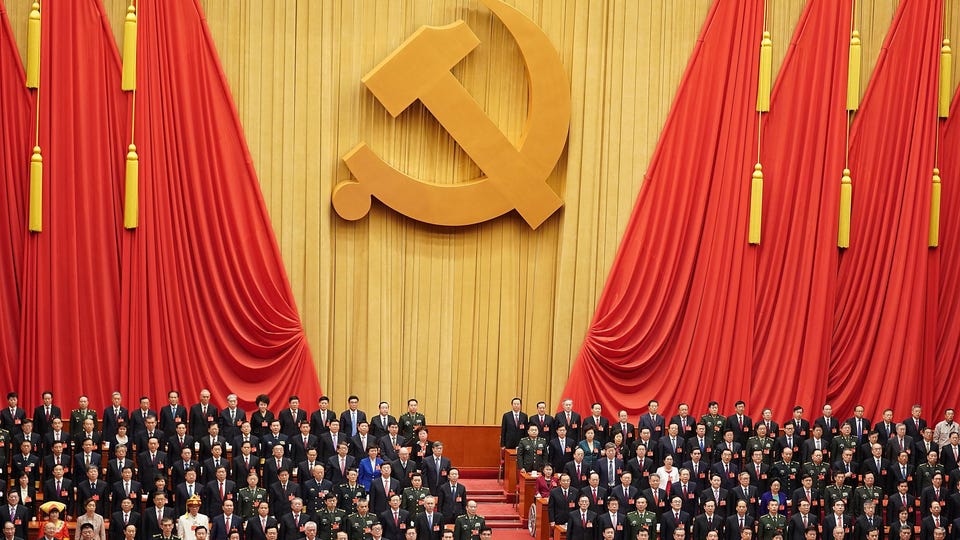Asia Six Words That Define China’s National Party Congress Frank Lavin Contributor Opinions expressed by Forbes Contributors are their own. I write about Asia’s economic, trade and policy matters. Following New! Follow this author to stay notified about their latest stories.
Got it! Sep 6, 2022, 02:00am EDT | Share to Facebook Share to Twitter Share to Linkedin Chinese President Xi Jinping, center, and other politicians and delegates listen to the national . . .
[+] anthem during the closing of the 19th Communist Party Congress at the Great Hall of the People on October 24, 2017 in Beijing, China. Lintao Zhang/Getty Images Last week, the Communist Party of China (CPC) announced that its long-anticipated 20th congress, which meets every five years as the supreme decision-making body in China, will be held on October 16. The congress is not as much of a decision-making body as it is a communications and management exercise.
Actual decisions will be made by the Central Committee, an executive committee that meets one week earlier, on October 9. So the Congress is a mechanism to reinforce leadership preferences and not a body for debate or discussion. Yet, even with that caveat, the NPC is a must-watch event for insights on China’s development.
The most important development of this year’s NPC will be for Xi Jinping to secure an unprecedented third term as president, further cementing his status as the country’s most powerful leader. Beyond that, look for the following six themes to be delivered over the course of the CPC meeting: Success. Ignore the slowdown in economic growth, the Covid lockdowns, and housing crisis.
The Communist Party does not believe in equivocation or second-guessing. There is only one acceptable message, and it must be a self-confident one: China is the most prosperous it has ever been in its history. It’s on the right track.
Communist Party leadership has been good for China and good for the world. To the extent that China has international issues or friction, it is because of the success. Other powers are jealous of China’s record or cannot reconcile themselves with the possibility of being supplanted in global leadership.
Destiny. Triumphant nationalism is all the more necessary for a party whose ideology was imported. Core message: We in this room stand as the natural next step in the history of both China and the Communist Party.
We are custodians of Chinese civilization and geopolitical destiny, and the Communist Party is the vehicle that allows us to be successful. Continuity. A vital theme when leadership is making its move for a third term.
This is not a moment for reform or experiments. Gorbachev’s death reminds us what happens if you start playing with “liberalization” or accepting western values. Message: China’s leadership team is tested and sound.
Consolidation. It is Xi’s party now. Xi will undertake a modest re-shuffling of portfolios, the net result of which will be to strengthen his hold on the party apparatus.
There is no space for factions, loyal opposition or independent personalities. In the CPC, there is only one question on the job interview: “Are you one of us?” And this job interview lasts fifty years. Internal cohesion is the supreme value.
Challenges. Dictatorships typically subscribe to devil theories, which have the advantages of offering exculpation without sounding weak. China is facing unprecedented times: Covid, drought, inflation—and only the CPC under Xi’s leadership can manage these threats.
Insularity. This is not so much a theme as a by-product. Misreading foreign behavior and intent is common in societies where there is no open discussion or debate.
And it is advantageous to portray China as a victim. Message: There are challenges within and without, such as foreign aggression, Taiwan splitists, and domestic malcontents. In the CPC world, criticism is more likely to be seen as evidence of the critic’s bad faith, not evidence of substantive problems.
The ultimate expression of this can take the form of defiance or even churlishness, though Xi’s style is usually more sedate and pedantic than one of anger. He needs to convey forcefulness and he does use scorn against his critics, but he is unlikely to adopt a Trump-style tone of belligerence. The bottom line: The goal of this party congress is no surprises and there is every indication that by that measurement, the CPC will achieve its goal.
Only after the party congress is over and the leadership is confirmed for a new term will they be able to reevaluate domestic policies such as the Covid lockdown or the falling birth rate, and international positions such as subsidized loans. China might have to deal with some bad weather next year, but on October 16, the sun will be shining. MORE FOR YOU China Detains Fallen HNA Ex-Billionaire Chairman Ahead Of Airline Restructuring Vote Nasdaq Listing Of Freshworks Creates Windfall For Indian Founder And Hundreds Of Employees Ninja Van Becomes Singapore’s Newest Unicorn After Raising $578 Million From Alibaba, B Capital Chinese President Xi Jinping joins a deliberation with deputies from Hubei Province at the third .
. . [+] session of the 13th National People’s Congress (NPC) in Beijing, China, May 24, 2020.
Li Xueren/Xinhua via Getty Images Follow me on Twitter or LinkedIn . Check out my website . Frank Lavin Editorial Standards Print Reprints & Permissions.
From: forbes
URL: https://www.forbes.com/sites/franklavin/2022/09/06/six-words-that-define-chinas-national-party-congress/



